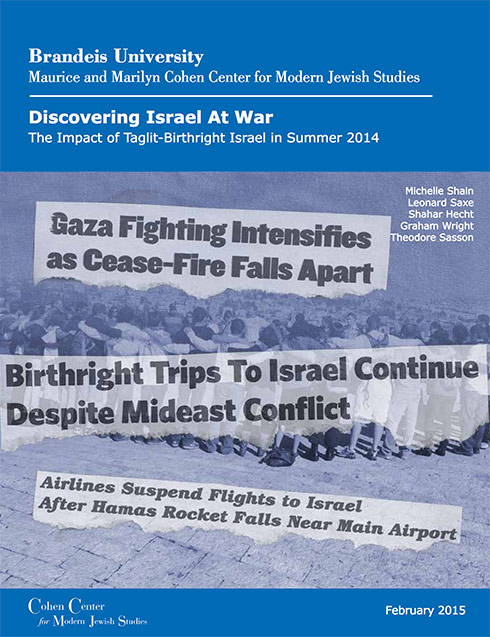Discovering Israel at War: The Impact of Taglit-Birthright Israel in Summer 2014
Michelle Shain, Leonard Saxe, Shahar Hecht, Graham Wright, Theodore Sasson
February 2015
 This report focuses on findings from a study of summer 2014 Birthright Israel applicants and participants. Summer 2014 was notable for three reasons. First, the summer trips attracted the largest group of applicants since the program’s inception. Second, for the first time, applicants who had had a peer educational experience in Israel during their high school years were eligible to apply to the program. Third, the program occurred during a six-week war in which missiles were fired from Gaza into Israeli population centers and Israel responded with a military intervention in Gaza, “Operation Protective Edge.” The report focuses on understanding the degree to which the change in the applicant pool affected perceptions of the trip experience, the impact of the trip itself on connection to Israel and sense of Jewish identity, and the impact of the conflict in Gaza on trip experiences and trip impact.
This report focuses on findings from a study of summer 2014 Birthright Israel applicants and participants. Summer 2014 was notable for three reasons. First, the summer trips attracted the largest group of applicants since the program’s inception. Second, for the first time, applicants who had had a peer educational experience in Israel during their high school years were eligible to apply to the program. Third, the program occurred during a six-week war in which missiles were fired from Gaza into Israeli population centers and Israel responded with a military intervention in Gaza, “Operation Protective Edge.” The report focuses on understanding the degree to which the change in the applicant pool affected perceptions of the trip experience, the impact of the trip itself on connection to Israel and sense of Jewish identity, and the impact of the conflict in Gaza on trip experiences and trip impact.
- Read the report
- Read the technical appendices
- Read the oped: How Do Young American Jews Feel About Israel? Tablet Magazine, February 24, 2015
Key Findings
- Participants viewed the trips very favorably.
- Participants stressed the educational value of the trip.
- Participants demonstrated significant increases in connection to Israel, their Jewish identity, and their Jewish community as a result of the combined influence of the Gaza conflict and the Taglit trip.
- Both participants and nonparticipants demonstrated high levels of support for Israel and its actions during Operation Protective Edge, with participants demonstrating higher levels of support: 70% of participants said they “very much” felt support for Israel compared to 61% among nonparticipants. Even among those who described themselves as “extremely liberal” or “liberal,” levels of support for Israel were high: 52% “very much” felt support for Israel and 28% reported feeling “somewhat” supportive.
- Those who had had a peer educational experience in Israel during their high school years and were newly eligible for Taglit had very similar Jewish backgrounds to those who had visited Israel under other circumstances (e.g., visits with family) and had always been eligible for Taglit.
- There was no evidence to suggest that the inclusion of newly eligible individuals detracted from the experience of other participants. Both those with and without prior Israel experience had very positive views of the trip.
- Participants who were on trips during Operation Protective Edge were more likely to report that they were concerned about safety compared to those who were in Israel earlier that summer, yet for the most part they did not feel personally threatened. Those who were on the trips during Operation Protective Edge were more likely to report that the trip included thoughtful discussion of the Israeli-Palestinian conflict compared to those who participated earlier in the summer.